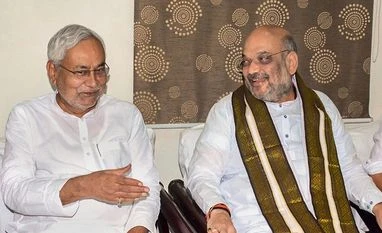Despite Amit Shah's assurance, uncertainty ahead for JD(U)-BJP in Bihar
The JD(U) had voted in favour of the Citizenship (Amendment) Bill in Parliament but after nationwide protests, Nitish Kumar opposed NRC
)
Bihar CM Nitish Kumar with Amit Shah
Decimation of the opposition in Lok Sabha polls provided a bulwark to Bihars ruling JD(U)-BJP coalition against its rivals in the first half of 2019, although it came under criticism in the subsequent months as a massive brain fever outbreak left 200 children dead, and flash floods reduced parts of the state capital to marooned islands.
A combination of various factors helped Bihar's NDA - of which Ram Vilas Paswans LJP is also a constituent - grab 39 out of 40 Lok Sabha seats, while Lalu Prasads RJD, which had seemed invincible until its ouster from power in 2005, drew a blank.
The only non-NDA party to have won a seat was the Congress, an RJD ally but a spent force in the state. The magnitude of the NDAs victory was stupendous. Of the 243 assembly segments in the state, parties outside the BJP-led coalition could establish a lead in just 18.
In addition to weaknesses of the opposition, the NDA appeared to have benefited from the combined charisma of its leaders, seamless transfer of votes, and last but not least, the patriotic fervour triggered by the Balakot air strikes -- carried out in retaliation for Pulwama terror attack in which the state had lost two sons of soil.
Towards the end of the year, however, the Citizenship (Amendment) Act, 2019 considered a precursor to nation-wide implementation of National Register of Citizens -- left the state astir and the NDA partners uncomfortable, with JD(U) boss and Chief Minister Nitish Kumar firmly opposing the NRC exercise. The JD(U) had voted in favour of the Citizenship (amendment) Bill in Parliament.
Also Read
The year also saw the rare instance of a sitting High Court judge being stripped of his jurisdiction by a bench of 11 judges which took exception to his averments on corruption in the judiciary.
Rapprochement was achieved after the judge -- Justice Rakesh Kumar -- along with the then HC Chief Justice A P Sahi, met the chief justice of India, who reassigned him his jurisdiction, but not before expunging his order for probe into corruption.
Earlier in the year, the Supreme Court had transferred to a New Delhi court the trial of Muzaffarpur shelter home sex scandal case expressing disgust with its tardy progress. The trial has now been concluded by the POCSO court at Saket and pronouncement of verdict is likely shortly.
The opposition, which had been in disarray since the Lok Sabha drubbing, made a comeback with its recent success in the by-polls. Torpor was evident in the Grand Alliance, when it failed to put the government on the mat over issues like Acute Encephalitis Syndrome and flash floods.
At least 130 people were killed and close to 90 lakh displaced in 13 districts, while torrential rainfall in October brought life to a grinding halt in many Patna localities. Thousands of residents had to be evacuated from their houses or remained stranded for days, subsisting on food and water air-dropped from IAF helicopters or supplied through disaster management forces reaching out to them on boats.
The question as to who would head the new government in the event of NDA returning to power in 2020 also kept the pot boiling until Amit Shah sought to put a lid on the controversy by asserting that BJPs near-hegemonic status notwithstanding, the coalition will be headed by Nitish Kumar.
The political moves by Kumar remained in news all through the year as he refused to have his party represented in the Union council of ministers, commanded the JD(U) to stage walk outs on bills that made instant triple talaq a punishable offence and stripped Jammu and Kashmir of statehood and special status.
However, when his MPs voted in favour of the Citizenship (amendment) Bill --having opposed it nine months earlier it took all by surprise.
In adjoining Jharkhand, the JD(U) fought against the BJP in the assembly polls but more eyebrows were raised when Kumar chose to back his old friend Saryu Roy, a former state minister, who contested against the chief minister of the tribal state Raghubar Das.
Kumar had a big reason to smile when his recent thrust on environment conservation and climate change, scoffed at by critics, was lauded by a figure no less than Bill Gates.
The RJD, which saw a dramatic rise in its electoral fortunes in 2015 when it contested assembly polls in alliance with the JD(U), remained sharply divided on wooing the chief minister back to the Grand Alliance.
While some veterans are in favour, Tejashwi Yadav
Lalu Prasads younger son, heir apparent and chief ministerial candidate of the party- has been mortified at the suggestion.
Moreover, the party, essentially controlled by Prasads family, is faced with a crisis more fundamental to its survival. The marital dispute involving the elder son
earlier dismissed as a "family issue" has begun to play itself out on the streets.
Aishwarya Roy, the taciturn daughter of party MLA Chandrika Roy, was married to Tej Pratap Yadav in May last year, but he filed a divorce petition six months later. Roy came out with public accusations of torture by her in-laws on more than one occasion.
She recently filed an FIR accusing her mother-in-law Rabri Devi, a former chief minister, of beating her up and driving her out of her house where she had chosen to stay back in an attempt to salvage her marriage.
Rabri Devi has responded with a police complaint that she faced threat to her own life from her daughter-in-law.
More From This Section
Don't miss the most important news and views of the day. Get them on our Telegram channel
First Published: Dec 25 2019 | 3:20 PM IST


